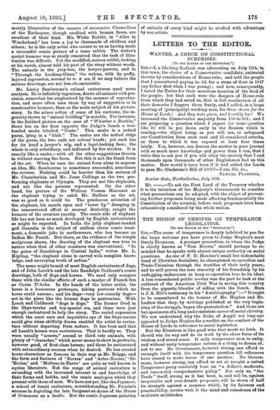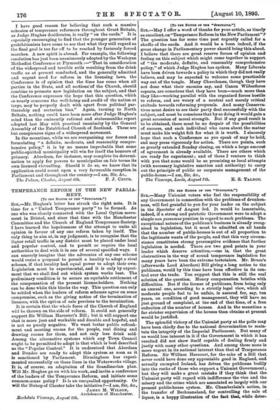THE BISHOP OF CHESTER ON TEMPERANCE LEGISLATION.
[TO THE EDITOR OF THE "SPECTATOR,"] SIR,—The cause of temperance is deeply indebted to you for the large welcome you have given to Judge Hughes's most timely Eirenicon. A younger generation, to whom the Judge is chiefly known as "Tom Brown," should perhaps be re- minded that he speaks with almost unique authority on social questions. As one of F. D. Maurice's small but indomitable band of Christian Socialists, he championed co-operation and Trade-Unionism through the troubles of their early years ; and he still proves the rare sincerity of his friendship by his unflagging endeavours to keep co-operation true to its ideal. A less remembered public service was the part he took at the outbreak of the American Civil War in saving this country from the gigantic blunder of siding with the South. Here is J. S. Mill's testimony in his " Autobiography ":—" It ought to be remembered to the honour of Mr. Hughes and Mr. Ludlow that they, by writings published at the very begin. ning of the struggle, began the protestation." And these are but specimens of a long and consistent career of social chivalry. We can understand why the Duke of Argyll not long ago appealed to Judge Hughes for a verdict on the conduct of the House of Lords in reference to social legislation.
But the Eirenicon is like good wine that needs no bash. It should win its way and do its work by the sheer force of ite wisdom and sound sense. It calls temperance men to unity, and without unity temperance reform is a thing to dream of, not to see. No Government, however strong, can afford to entangle itself with the temperance question till reformers have ceased to make havoc of one another. No Govern- ment, however strong, can afford to set at nought a united Temperance party resolutely bent on "a definite, moderate, and reasonably comprehensive policy." Not only so, "the Trade" itself, strong as it has been, is, and will be, against inequitable and over-drastic proposals, will be shorn of half its strength against a measure which, by its fairness and practicability, carries with it the mind and conscience of the moderate multitudes. I have good reason for believing that such a massive cohesion of temperance reformers throughout Great Britain, as Judge Hughes desiderates, is really "on the cards." It is especially encouraging to find that the younger generation of prohibitionists have come to see that what they still regard as the final goal is too far off to be reached by furiously forced marches. A new spirit is abroad. For example, the following resolution has just been unanimously adopted by the Wesleyan Methodist Conference at Plymouth :—" That in consideration of the widespread and terrible evils resulting from the drink traffic as at present conducted, and the generally admitted and urgent need for reform in the licensing laws, the Conference is of opinion that the time has come when all parties in the State, and all sections:of the Church, should combine to promote new legislation on the subject, and that the Conference expresses the hope that this question, which 03 nearly concerns the well-being and credit of the nation at large, may be properly dealt with apart from political par- tisanship and sectarian bias." Again, turning to North Britain, nothing could have been more after Judge Hughes's mind than the eminently rational and statesmanlike report adopted last May with practical unanimity by the General Assembly of the Established Church of Scotland. These are but conspicuous signs of a widespread movement.
In the meantime, while we are reorganising our forces and formulating "a definite, moderate, and reasonably compre- hensive policy," it is by no means improbable that some public-spirited municipality will win for itself the honours of primacy. Aberdeen, for instance, may complete its determi- nation to apply for powers to municipalise on fair terms its own licensed victualling. Should it do so, we know that its application could count upon a very favourable reception in Parliament and throughout the country.—I am, Sir, &c., The Palace, Chester, August 6th. F. J. CESTR.



































 Previous page
Previous page